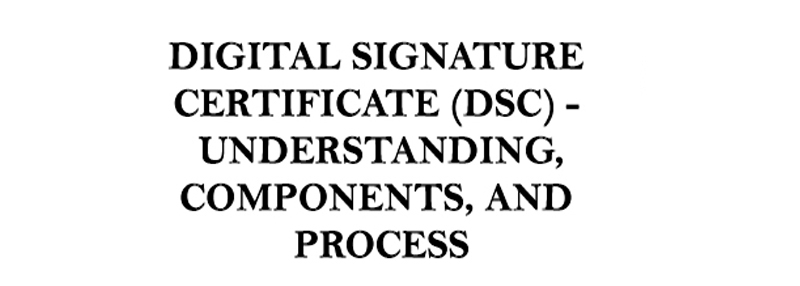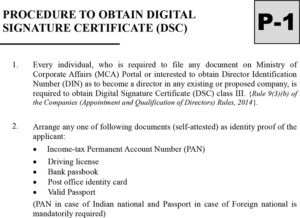
In today’s technological world’s digital age, where electronic transactions are ubiquitous, ensuring the security and authenticity of a documents is paramount. Digital Signature Certificates (DSCs) play a crucial role in this landscape, providing a secure means of authentication, data integrity, and non-repudiation. The author has delved into the intricacies of DSCs, exploring their components, the processes involved in obtaining, using, and renewing them, as well as the security measures required to safeguard these certificates. A DSC is a secure digital key that is used to sign electronic documents which serves as a digital equivalent of a handwritten signature, offering authentication, data integrity, and non-repudiation. The components of DSC are (a) a Private Key which is akin to the signer’s unique, which is securely held by the certificate holder and is used to generate the digital signature on electronic documents whereby the utmost care must be taken to safeguard the private key from unauthorized use or access, (b) a Public Key which is the counterpart to the private key, where the public key is distributed widely and is used by recipients to verify the authenticity of the digital signature. It is embedded within the digital certificate and serves as a cryptographic identifier for the certificate holder. The important thing here is that unlike the private key, the public key can be freely shared without compromising security, and (c) a digital certificate which contains crucial information such as the public key, the identity of the certificate holder, the issuing authority, and the validity period of the certificate and even the date of using of the certificate.
DSC is issued by trusted entities known as Certificate Authorities (CAs). These CAs adhere to stringent guidelines and security protocols to ensure the authenticity and integrity of the certificates they issue. The issuance process involves thorough verification of the certificate applicant’s identity to mitigate the risk of fraudulent use. DSC has a definite validity period, typically ranging from one to three years. During this period, the certificate is deemed valid for use in digital transactions, providing assurance to the parties involved. However, once the validity period expires, the certificate becomes invalid, and any digital signatures generated with it may no longer be considered trustworthy. In case of renewal of DSC beyond its validity period, the certificate holder must undergo the same process as it went through the process of obtaining original DSC.
The details provisions can be studied from my book titled as Company Law Procedures and Compliances.






